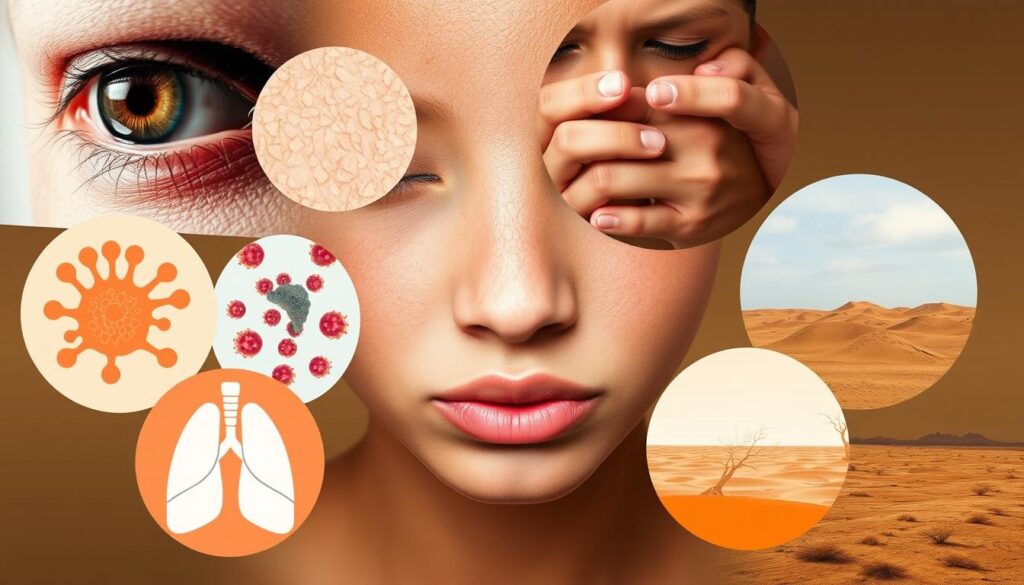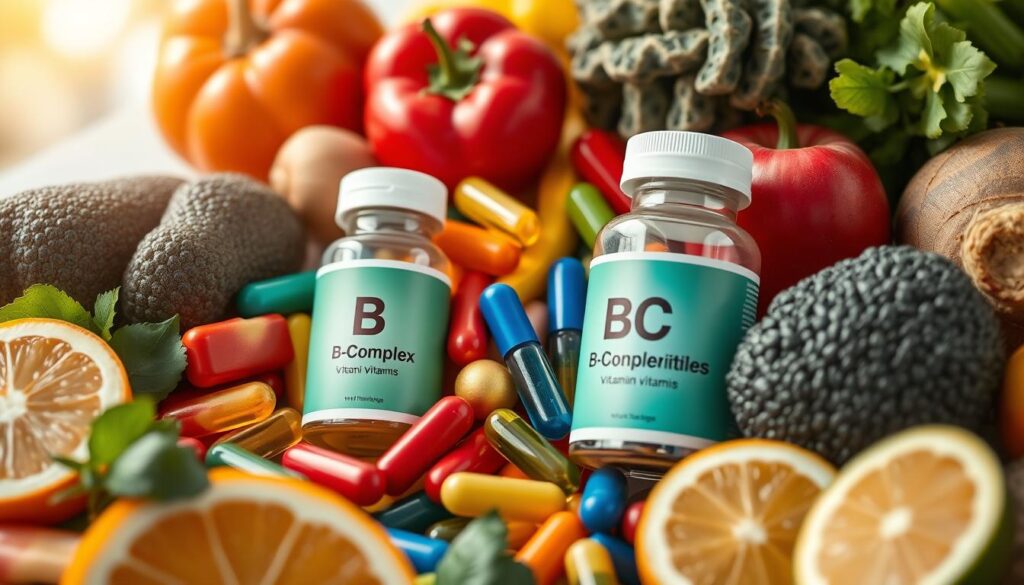Vitamin A is key for your health. Not having enough can cause problems. Eating right or taking supplements can help.
Table of Contents
ToggleMen over 14 need 900 mcg RAE of Vitamin A. Women over 14 need 700 mcg RAE. Pregnant women need 750 mcg RAE. Foods like beef liver and sweet potatoes have lots of Vitamin A.
Learning about Vitamin A symptoms is important. It helps keep you healthy. You’ll see how it affects your eyes and immune system.
Understanding Vitamin A Deficiency: Causes and Risk Factors
Vitamin A deficiency is a big problem in Africa and South-East Asia. More than half of all countries see it as a major issue. In the United States, it’s rare but can happen if you eat poorly or have certain health issues.
If you don’t eat well or have health problems like celiac disease, you might get vitamin A deficiency. Eating foods rich in vitamin A can help avoid this problem. A balanced diet is key to preventing vitamin A deficiency.
Common Causes of Vitamin A Deficiency
- Poor diet
- Certain medical conditions, such as celiac disease or Crohn’s disease
- Malabsorption
Who is Most at Risk?
People with a limited diet or health issues are at high risk. Eating foods rich in vitamin A can help prevent deficiency. Knowing the risks helps you take steps to avoid them.
The Role of Diet in Prevention
Eating a balanced diet with foods high in vitamin A is crucial. This includes animal products and vegetables. Knowing the risks and taking steps to prevent them is important.
Key Warning Signs of Vitamin A Deficiency in Your Body
Vitamin A deficiency can cause many symptoms. The National Institutes of Health say it can lead to night blindness and dry eyes. It’s important to know the warning signs.
Common signs include night blindness, skin changes, and a weak immune system. Night blindness makes it hard to see in the dark. Skin changes can cause dryness and itchiness. A weak immune system makes you get sick easier.

- Reproductive health issues, such as infertility and miscarriage
- Growth and development delays in children
- Respiratory tract infections due to weakened immunity
- Vision loss and blindness
It’s key to act fast to avoid lasting damage. If you see these signs, talk to your doctor. They might suggest diet changes or supplements to help.
How B-Complex Vitamins Support Vitamin A Absorption
B-Complex Vitamins are key for our health. They help our body use vitamin A better. You can learn more about B-Complex Vitamins on healthline. This supplement has eight B vitamins. These vitamins help with energy, nerves, and heart health.
B-Complex Vitamins have many benefits. They can lower skin cancer risk, boost the immune system, and keep red blood cells healthy. For more on B vitamins for women’s health, check out drgooddeed. Foods rich in B vitamins include almonds, avocado, and eggs.
Here are some important points about B-Complex Vitamins and vitamin A absorption:
- B-Complex Vitamins help our body use vitamin A better. Vitamin A is good for eyes, immune system, and skin.
- Vitamin B2 might help prevent diseases like Parkinson’s.
- Vegetarians and people with gut issues might need B complex supplements.
For more on vitamin B complex and nutrition, visit 
Natural Sources and Dietary Solutions for Vitamin A Deficiency
To fight vitamin A deficiency, we need to eat foods rich in vitamin A. The National Institutes of Health says adults should get 700-900 micrograms of vitamin A each day. Foods like sweet potatoes, carrots, dark leafy greens, and fatty fish are good sources.
Planning your meals is key to getting enough vitamin A. Sweet potatoes are a great choice because they’re full of vitamin A. Medical News Today says sweet potatoes are among the top vitamin A foods.

For dietary solutions, planning your meals is important. You can talk to a healthcare expert or a dietitian for a meal plan. They can help you eat foods rich in vitamin A and other nutrients. Also, taking multivitamin tablets can help. Dr. Gooddeed says picking the right multivitamin is key.
Some top foods for vitamin A are:
- Sweet potatoes
- Carrots
- Dark leafy greens
- Fatty fish
Eating these foods and using dietary solutions can prevent vitamin A deficiency. This helps keep you healthy.
Conclusion: Taking Action for Your Vitamin Health
Keeping enough vitamin A is key for your health. Knowing why you might not have enough and how to fix it is important. The eating well can help you get enough vitamin A.
Adults need 900 mcg of vitamin A each day. Pregnant women might need more. Eating foods like sweet potatoes and carrots can help. Talking to a doctor about supplements is also a good idea.
Learning about vitamin A and eating right can make you feel better. Adding foods rich in vitamin A to your diet is a good start. Your body, eyes, and skin will be happy.
FAQ
What are the symptoms of vitamin A deficiency?
Signs of vitamin A deficiency include night blindness and dry eyes. It also affects the immune system and skin. Reproductive health can also be impacted.
What causes vitamin A deficiency?
Poor diet and certain health issues can lead to vitamin A deficiency. This includes celiac disease or Crohn’s disease. People with limited diets or specific health problems are at higher risk.
How do B-Complex Vitamins support vitamin A absorption?
B-Complex Vitamins help the body use vitamin A better. They keep vitamin A levels healthy and support overall health.
What are the best food sources of vitamin A?
Sweet potatoes, carrots, and dark leafy greens are great for vitamin A. Fatty fish is also a good source. Eating these foods helps avoid deficiency.
What is the recommended daily intake of vitamin A?
Vitamin A needs change with age and gender. Planning meals with vitamin A-rich foods helps meet daily needs.
Source Links

This article is medically reviewed by Dr. Chandril Chugh, Board-Certified Neurologist, providing expert insights and reliable health information.
Dr. Chandril Chugh is a U.S.-trained neurologist with over a decade of experience. Known for his compassionate care, he specializes in treating neurological conditions such as migraines, epilepsy, and Parkinson’s disease. Dr. Chugh is highly regarded for his patient-centered approach and dedication to providing personalized care.








